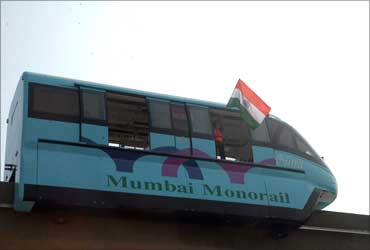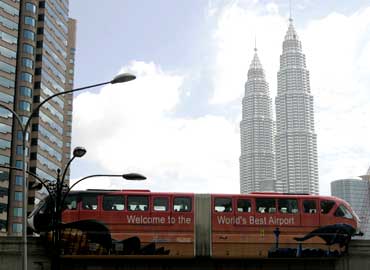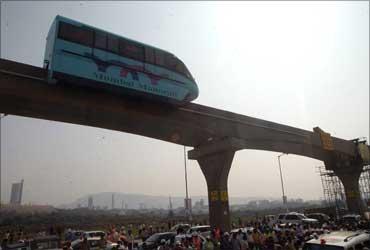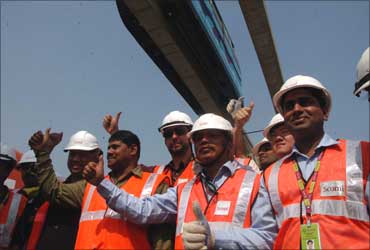 | « Back to article | Print this article |
Mumbai boasts of the country's 1st monorail
Engineering major Larsen & Toubro and Malaysia's Scomi Group are expected to commission the first phase of Mumbai Monorail, India's first such system, by end of this year.
The Rs 2,460-crore (Rs 24.60 billion) project, an initiative of the Mumbai Metropolitan Regional Development Authority, is a modern urban transport where cars move on a single beam in an elevated corridor.
The project involves design, construction, installation, testing and commissioning from Wadala and Chembur (in suburban Mumbai) via Mahul (approximately 9 km) in Phase I and Gadge Maharaj Chowk to Wadala (approximately 11 kilometres) in Phase II. Click NEXT to read further. . .
Mumbai boasts of the country's 1st monorail
"Phase I, from Wadala to Chembur (in suburban Mumbai), is expected to be completed and commissioned by this year-end. The second phase is expected to be completed by December 2011," L&T's executive vice-president & head--corporate initiatives, Shailendra Roy said.
He was speaking at the monorail's trial run, which was attended by Maharashtra Chief Minister Ashok Chavan.
"The second phase of the monorail is expected to be completed next year. About three to three-and-a-half-lakh commuters, mainly the city's working class, will benefit from this air-conditioned transport system," Chavan said. Click NEXT to read further. . .
Mumbai boasts of the country's 1st monorail
The two routes will have 15 sets of four-car trains plying at each station after every four minutes.
Each coach can accommodate up to 130 persons (or a total of about 8,000 people) and is the latest version of the monorail coaches that ply in Kuala Lumpur.
"The project is being implemented on a lump-sum turnkey basis. L&T and Scomi will be responsible for operations and maintenance for the next three years, after which the maintenance contract may be extended or MMRDA could take over," Roy said. Click NEXT to read further. . .
Mumbai boasts of the country's 1st monorail
Coaches for the monorail are manufactured at Rawang near Kuala Lumpur in Malaysia and shipped to India. Scomi is in talks with the Maharashtra government to set up a coach-making unit in the state which will help India save tax of about 15-20 per cent, a Scomi official said.
The straddle-type monorail system complies with the highest of international standards of safety.
Monorail systems have the advantage of substantially lower cost with minimal noise and are capable of negotiating sharp curves, which a metro rail cannot. Click NEXT to read further. . .
Mumbai boasts of the country's 1st monorail
It also does not require destruction of a city's green cover and has well thought-out safety measures whereby commuters can glide to the ground through a chute in case of a fire.
Mumbai Monorail's success is expected to pave the way for more monorail systems in India.




